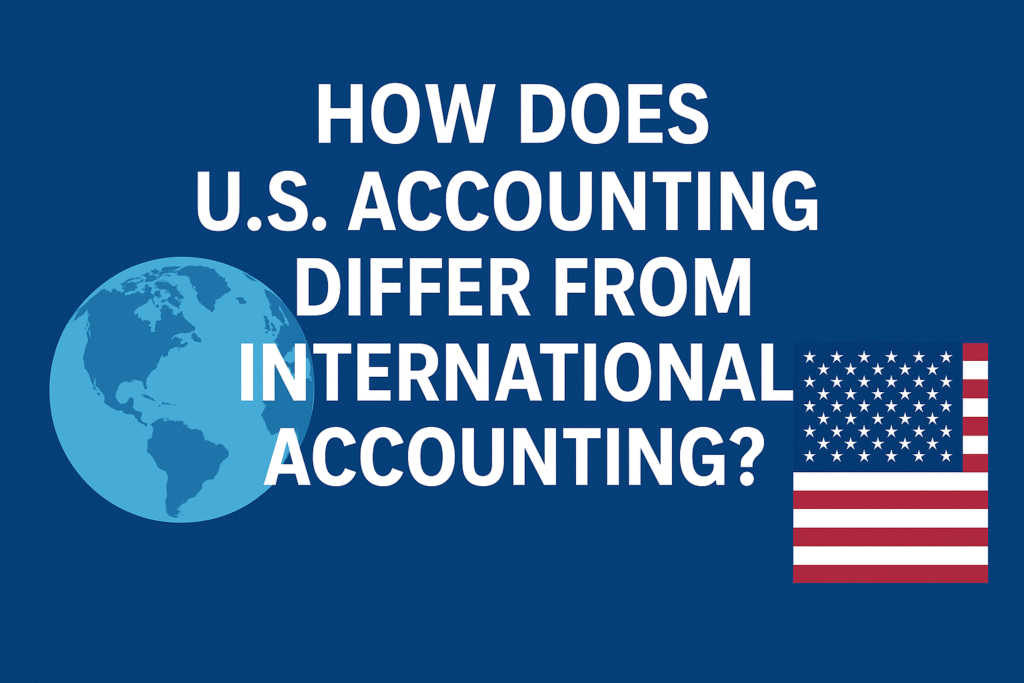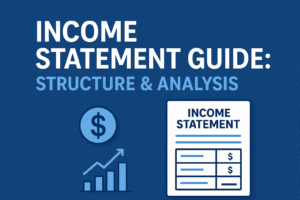Accounting is often described as the “language of business,” but the language isn’t uniform across the globe. The United States follows Generally Accepted Accounting Principles (GAAP), while most other countries follow International Financial Reporting Standards (IFRS). Understanding the differences between these frameworks is critical for businesses, investors, and professionals operating internationally.
This article explores key differences between U.S. accounting and international accounting, including inventory practices, asset treatment, required documentation, and compliance requirements. It also explains whether GAAP is better than IFRS and which companies must follow GAAP in the U.S.
Inventory Accounting Differences
One of the most significant differences between U.S. GAAP and IFRS lies in inventory valuation methods.
- GAAP: Permits FIFO (First-In, First-Out), LIFO (Last-In, First-Out), and weighted average cost methods. LIFO is often used in the U.S. for tax benefits, especially when prices are rising, as it reduces taxable income by reporting higher costs of goods sold (COGS).
- IFRS: Allows FIFO and weighted average cost, but does not allow LIFO. IFRS considers LIFO less reflective of actual inventory flow and economic reality.
Example:
- A U.S. company using LIFO might report lower profits (and lower taxes) than an international competitor under IFRS, even if both handle identical inventory. This can lead to comparability issues in financial analysis.
Long-Lived Assets
The treatment of long-lived assets (like buildings, machinery, or equipment) also differs significantly between GAAP and IFRS.
- GAAP: Requires assets to be recorded at historical cost minus accumulated depreciation. Companies generally cannot revalue assets upward, even if market value increases.
- IFRS: Permits both the cost model and the revaluation model. Under revaluation, assets can be adjusted upward or downward based on fair market value, giving investors a more current picture of asset worth.
Example:
- A European company reporting under IFRS may show a higher balance sheet value for property if it has appreciated, whereas a U.S. company must stick to its original purchase price (less depreciation).
Required Documents for Financial Accounts
Both GAAP and IFRS require businesses to produce a set of financial statements, but the format and terminology differ.
Under GAAP (U.S.):
- Balance Sheet (Statement of Financial Position)
- Income Statement (Statement of Earnings)
- Statement of Cash Flows
- Statement of Shareholders’ Equity
Under IFRS (International):
- Statement of Financial Position
- Statement of Profit or Loss and Other Comprehensive Income
- Statement of Cash Flows
- Statement of Changes in Equity
While the overall purpose is similar, terminology, presentation, and disclosures vary, which can create challenges for multinational companies and investors analyzing cross-border reports.
What Is the Difference Between GAAP and IFRS?
While both aim to ensure transparency, consistency, and comparability in financial reporting, they differ in approach:
- Principles vs. Rules
- IFRS is principles-based, offering broader guidelines and allowing flexibility in interpretation.
- GAAP is rules-based, with detailed instructions and specific requirements for nearly every situation.
- Focus
- IFRS emphasizes substance over form, ensuring that financial statements reflect economic reality.
- GAAP emphasizes strict compliance, reducing ambiguity but sometimes leading to complexity.
- Adoption
- GAAP is used exclusively in the United States.
- IFRS is used in more than 140 countries, including the EU, Canada, Australia, and many parts of Asia and Africa.
Is GAAP Better Than IFRS?
The question of which system is “better” depends on perspective:
- Advantages of GAAP:
- Provides clear, detailed guidance for complex industries (banking, insurance, healthcare).
- Enhances consistency and reliability within the U.S. financial system.
- Advantages of IFRS:
- Offers global comparability across different countries.
- Allows more flexibility and judgment, giving a truer economic picture in some cases (like asset revaluation).
In essence:
- For U.S.-based companies, GAAP is better because it aligns with domestic regulations and taxation.
- For multinational businesses and investors, IFRS is often more useful due to its global acceptance.
Which Companies Are Required to Follow GAAP in the U.S.?
Not every business in the U.S. must use GAAP, but several entities are legally required to comply:
- Public Companies
- All companies listed on U.S. stock exchanges (NYSE, NASDAQ) must file GAAP-compliant financial statements with the Securities and Exchange Commission (SEC).
- Large Private Companies
- While not legally required, many large private firms follow GAAP to attract investors, secure financing, or prepare for future IPOs.
- Financial Institutions
- Banks, insurance companies, and investment firms must use GAAP for regulatory compliance.
- Government and Nonprofit Organizations
- They must follow specialized GAAP standards issued by the Governmental Accounting Standards Board (GASB) or the Financial Accounting Standards Board (FASB).
Small businesses, however, may choose simplified accounting methods or follow tax accounting rules instead of full GAAP reporting.
FAQs on U.S. vs. International Accounting
1. Can a U.S. company use IFRS instead of GAAP?
No, U.S. public companies are required by the SEC to use GAAP. However, private companies may choose IFRS for internal reporting or if they operate internationally. In practice, most U.S. companies still stick to GAAP because banks, investors, and regulators expect it.
2. Why doesn’t the U.S. adopt IFRS?
The U.S. has not adopted IFRS mainly due to:
- The complexity and cost of transitioning millions of companies.
- Differences in legal, tax, and regulatory environments.
- Strong reliance on detailed GAAP rules that U.S. stakeholders are accustomed to.
3. Do investors prefer GAAP or IFRS?
It depends:
- U.S. investors often prefer GAAP because it provides highly detailed rules and standardized reports.
- Global investors may prefer IFRS since it’s widely used and easier to compare across countries.
4. Is GAAP converging with IFRS?
Yes, the FASB (U.S.) and IASB (international) have worked on convergence projects to reduce differences. While full adoption of IFRS in the U.S. is unlikely in the near future, standards are gradually aligning, especially in areas like revenue recognition and leases.
5. Which is more flexible—GAAP or IFRS?
IFRS is more flexible because it’s principles-based, allowing professional judgment. GAAP is stricter, reducing ambiguity but often creating complexity.
6. Do small U.S. businesses need to follow GAAP?
No, small private businesses can use simplified accounting methods or just follow IRS tax rules. GAAP is primarily mandatory for public companies and financial institutions.
Final Thoughts
U.S. GAAP and IFRS differ in philosophy, application, and global reach. While GAAP dominates in the U.S., IFRS sets the standard globally. Professionals and businesses that understand both frameworks are better prepared for cross-border transactions, global investment, and compliance challenges.






